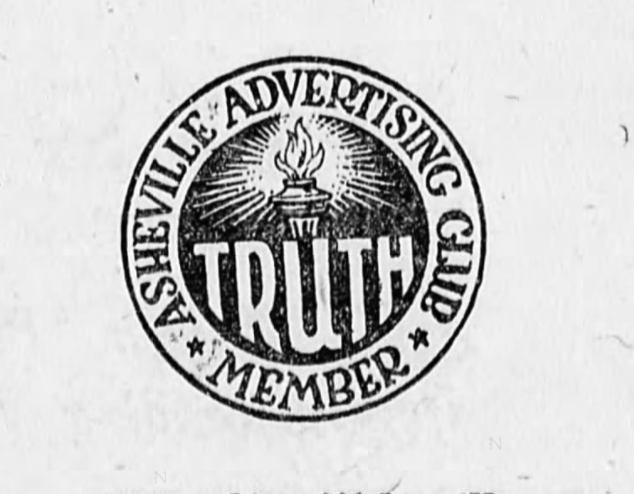Honesty was on the minds of many local merchants at the start of 1922. That February, The Asheville Citizen reported the formation of the Asheville Advertising Club. Though similar talks had begun several years earlier in the 1910s, the initial movement appears to have been stymied by World War I efforts and the subsequent recession-turned-depression that marked the start of the 1920s.
But by 1922, with an improved economic outlook, city merchants rallied around truth-telling as a means of building a stronger and sounder business community.
In a Feb. 8, 1922, article announcing the club’s imminent formation, The Asheville Citizen wrote, “The Asheville Advertising club, when fully organized, following the election of officers and selection of committees, will have as its principal aim the elimination of untruthful advertising.”
Two days later, L. Edwin Gill was elected president of the new club, with W.H. David as vice president and J.T. Henry as secretary-treasurer.
By early spring, the organization put forth its “Proposed Standard of Practice” in advertising, seeking feedback from the community. According to a March 28, 1922, article published by The Asheville Citizen, the plan called for a uniform approach in how merchants advertised and priced goods. “Such methods mean, for example, that the price-mark is carefully fixed at the proper percentage above cost,” the paper reported, “or that a bargain day price will be accompanied by the statement of the lowest as well as highest price at which the article has sold.”
A week later, the club, consisting of “forty prominent Asheville merchants,” adopted the practice, according to the April 2, 1922, edition of The Asheville Citizen.
Later that spring, the group set its sights beyond truthful advertising. “Taking its place with other clubs for the civic uplift of Asheville … the club endorsed a resolution to use every advantage in advertising the city and pledging itself to boost Asheville at every opportunity, individually and collectively,” The Asheville Citizen reported on May 19, 1922.
The club’s resolution, printed in its entirety in that day’s issue, began with the stated goal of expanding Asheville’s population from its then 28,504 to 75,000 by 1930. The resolution declared:
“We believe this increased growth can be stimulated and increased by special effort on the part of every individual citizen and by special activity on the part of all our commercial organizations to secure at least one industrial plant each year, and by adding more and better hotel facilities, and a large auditorium to attract the largest conventions, and by building a system of parks and large lakes for the wholesome amusement and entertainment for our visitors to keep them for a longer time and if possible to encourage them to become permanent residents.”
The resolution went on to implore nonmembers to do the same. “We call on every loyal citizen of Asheville to join us in every opportunity to boost Asheville first and all the time, to explain its every advantage as a city in which to live, to defend its fair name at all times and pledge our every effort to locate one permanent resident each year.”
The club continued to host regular meetings throughout much of the 1920s, though local coverage dwindled significantly over the proceeding years. Once the Great Depression hit, all mention of the group in local print disappeared.
A headline in the Sept. 18, 1930, edition of The Asheville Citizen reads, “Asheville’s Population In 1930 At 50,167,” a mere 24,833 shy of the club’s ambitious goal.
Editor’s note: Peculiarities of spelling and punctuation are preserved from the original documents.




Before you comment
The comments section is here to provide a platform for civil dialogue on the issues we face together as a local community. Xpress is committed to offering this platform for all voices, but when the tone of the discussion gets nasty or strays off topic, we believe many people choose not to participate. Xpress editors are determined to moderate comments to ensure a constructive interchange is maintained. All comments judged not to be in keeping with the spirit of civil discourse will be removed and repeat violators will be banned. See here for our terms of service. Thank you for being part of this effort to promote respectful discussion.